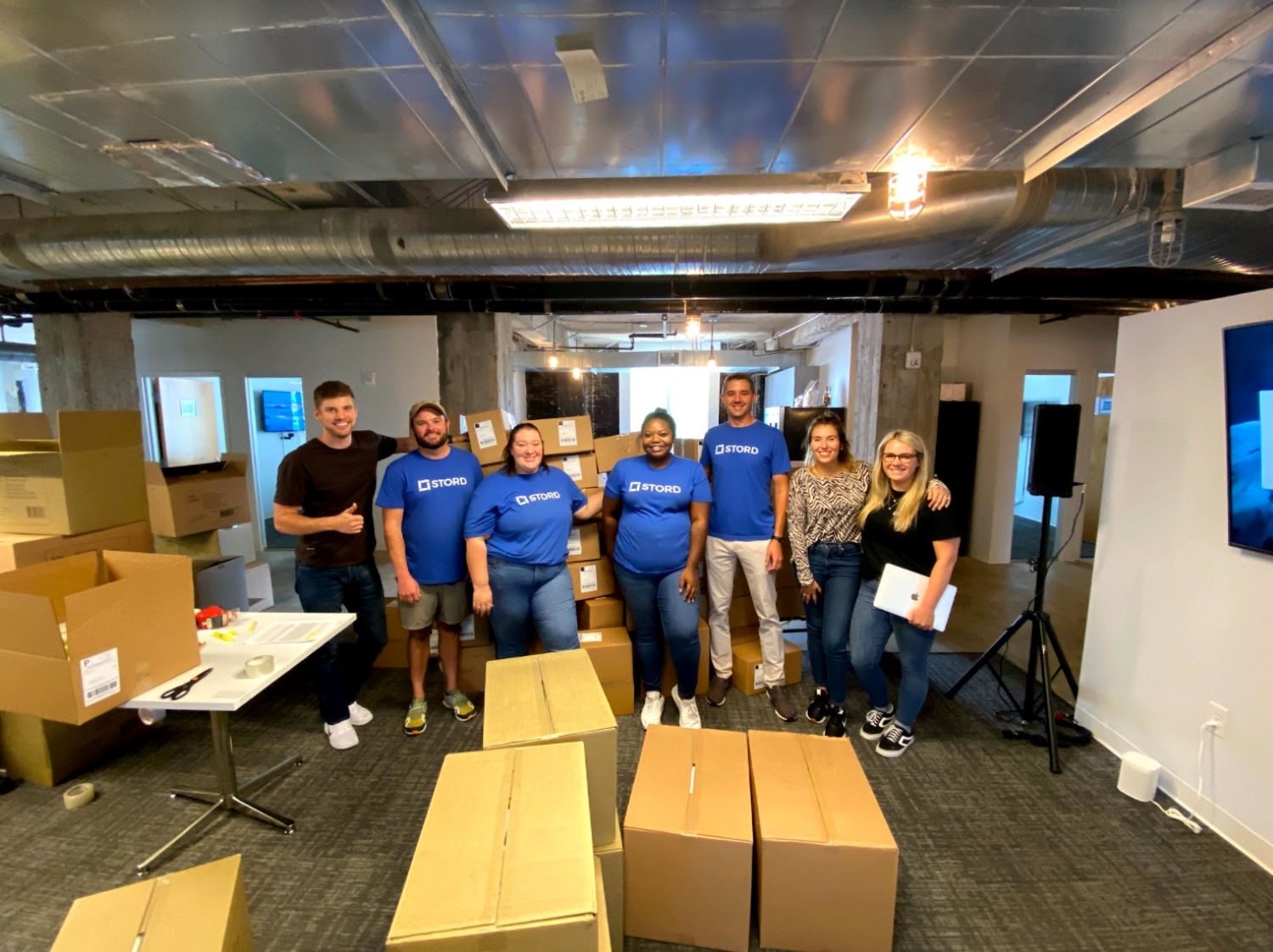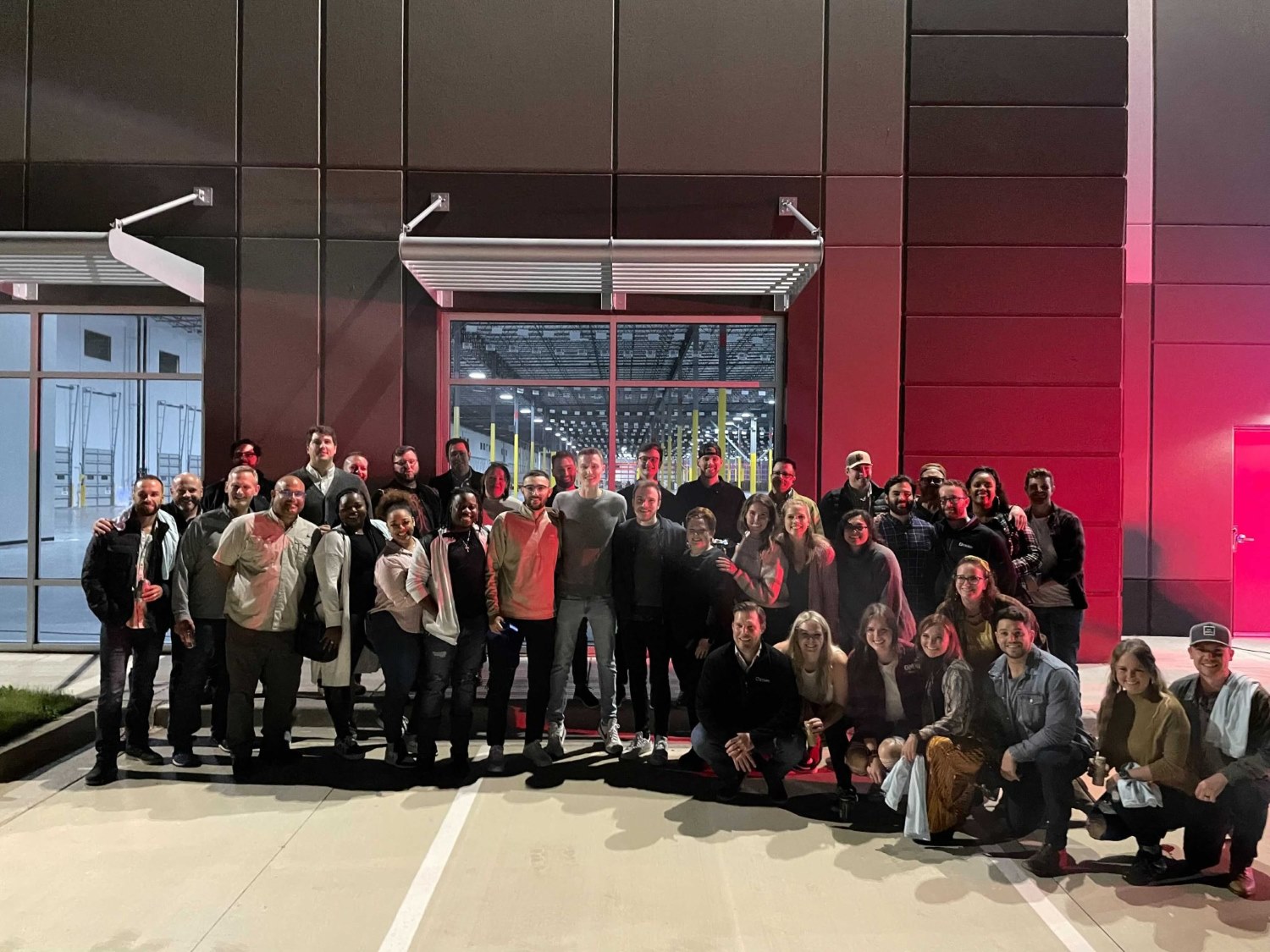The Under-30-Year-Old Duo to Ease Over-30-Year-Old Pain Point of the Supply Chain
What do people do in their early 20s? Probably, some were eating chips and watching the Super Bowl with Rihanna promoting her new line of makeup products. Meanwhile, some were trying to build their own throne but struggling in the initial days. While some of the young generations are looking for their mission in their lives, this duo, in their 20s, successfully built an empire.
They are Sean Henry, and Jacob Boudreau, founded flexible warehousing startup Stord while in college at Georgia Tech in 2015. Stord offers cloud supply chain services to brands looking for inventory visibility and control.
Its distribution network employs a cloud-based software platform that, through a one-time integration, creates intelligent, optimized, and self-correcting supply chains, while an elastic network of warehouses and transportation services ensures that every order is picked up, packed, and delivered on time from port to porch.
Today, Stord has entered a meteoric growth phase since its solution appeared as the silver bullet for the industry. However, what’s more fascinating is the journey to architect such strong name in the game. Let’s go through this piece of writing to learn about their path.
Young Boys’ Take on the Pain Point of the Supply Chain
Henry developed the concept for Stord when he was an adolescent eBay seller attempting to fulfill orders for electronics parts and wondering why there wasn’t a better solution. He founded the company as a student at Georgia Tech. He hired Boudreau, who was only 18 at the time, as cofounder and chief technology officer.
Instead of owning warehouses like industry major Prologis, Atlanta-based Stord uses software to connect firms in need of storage and distribution to independent warehouses with spare capacity. Its unique software handles everything from ordering to inventory management to billing.
With its extensive system of warehouses, Stord helps direct-to-consumer online retailers—and those who have struggled to rapidly evolve their businesses from brick-and-mortar to online, to keep pace with customer demands and with Amazon.
To help it do so, Stord hired Steve Swan, who had spent nearly seven years in logistics at Amazon, as its vice president of supply chain in October 2019.
“We’re trying to give them Amazon-level logistics for all,” Henry shared. “We’re trying to level the playing field.”
As young founders when they founded Stord, Sean Henry and his sidekick Jacob Boudreau tasted all the spices needed to build an ardent team.
The most complicated issue for a B2B software startup is getting its first customers. As an entrepreneur, you must be relentless in your execution and recognize that your number one responsibility when you first start is sales—getting your product into the hands of customers.
“Once you have even a small rate of user adoption, you can focus on learning, iteration, and scale. To combat this at STORD, I spent more than the first year as our primary salesperson working every day with our network of warehouses and with our customers who are shipping products through our network,” stated Sean Henry.
Henry stated that he needed to learn how to hire a team and stay on top of the business. Getting the Thiel Fellowship and networking with other young startups who are one or two steps ahead of him in their growth trajectory was critical, as shared by Henry.

“The hardest part is the ‘unknown unknowns.’ We haven’t worked for years in a massive organization,” he says. “Jake and I had to grow a lot as leaders as we’ve scaled the business.”
Hardship is something that forces you to push your limit, but what keeps them going continuously must be a mission in what they are doing.
Stord, for example, believes that shippers deserve a better distribution experience. One that is nimble rather than rigid, automated rather than manual, and intelligent rather than opaque. A technologically and innovatively altered ‘next generation’ distribution experience.
“Shippers Deserve a Better Distribution Experience”
The e-commerce boom has increased warehouse demand, but this has put a strain on available space, particularly for shippers with more irregular shipments.
The E-commerce expenditure in the United States is predicted to surpass one trillion dollars for the first time in 2022, with B2B online commerce expected to reach $25.65 trillion by 2028. A recent McKinsey survey found that 90% of supply chain executives expect to upgrade their supply chain planning IT within the next five years.
Clearly, space is limited. As warehouse space becomes scarce, companies wishing to relocate a single truckload to a warehouse for two weeks may be compelled to pay exorbitant fees or not move the load at all. They require a partner.
Simultaneously developing with the transition to digital phase, modern shippers require logistics expertise, strategy, and partnership to effectively operate in supply chains that are complex, brittle, and ever-changing. Shippers who effectively use technology and innovation to augment rather than replace these critical human factors will emerge as winners.
At the crossroads of these criteria, Networked Distribution was created – a concept that Stord is thrilled to pioneer and a new category they’re eager to lead.
Networked Distribution provides shippers with a central hub with one network, one platform, and one partner to streamline all warehousing and transportation by combining technology and data, a broad network of 3PLs, and high-touch support and logistical knowledge — all managed through a software interface.
“If you are a shipper, it doesn’t matter whether you need a warehouse in Miami, FL, or Oakland, CA, the experience is the same,” said Henry.
Stord allows shippers to enter shipment information, such as size, quantity of pallets or cases, and location, and Stord will respond with an estimate for an available facility. It is then up to the customer to accept or reject the quote.
Henry notes that after the quote is accepted, warehouse space is accessible within 24 hours. However, once the shipment is in the system, the Stord technology platform enables total visibility, including analytics, ordering, delivery and pickup scheduling, and live tracking and inventory changes.
“If you move 24 pallets out of a warehouse, the system will update that and tell you how many pallets are still in the warehouse,” Henry explained.
According to Henry, the entire process removes current manual processes. There will be no phone calls, faxes, or emails, and there will be no hunting for suitable warehouse space or negotiating rates. The process is initiated simply by entering the necessary information.
There is some competition in the market, but Stord’s business approach sets it apart.

“Other marketplaces allow anyone with an empty warehouse to rent space, from the guy who has an empty building to an XPO(a logistics company that has the storage capacity of more than 800 warehouses with 100 million square feet in the United States and Asia),” he explains. “But what we are doing is all our warehouses have forklifts, they have personnel who handle shipments.”
In essence, as Henry points out, the warehouses with which Stord collaborates have professional people and the appropriate equipment to allow the transfer of goods.
With nearly every state in the continental United States covered by a network of locations capable of handling frozen goods, some with direct port access, and others that can serve as regional distribution centers or regional fulfillment centers, shippers are likely to find a location that meets their needs.
Stord vets all of its warehouse partners to verify that they meet both industry and Stord requirements. According to Henry, everything in the Stord network is logged, including images of damage and order time stamping. According to him, the outcome is a damage rate of 0.008, which is lower than the industry norm.
Stord has contributed to lessening the load on the human side. However, what does its answer imply to its direct clients – businesses that are continuously looking to maximize their profits?
Brings Cost Savings and Technology to Warehousing
Today’s supply chain architecture and software tools have not advanced to meet Amazon Prime’s customer expectations. A patchwork of disconnected third-party logistics (3PL) provides an inflexible, expensive, and opaque logistics network. As a result, shipments are delayed, prices are raised, and customers are dissatisfied.
The epidemic exacerbated the problem, as e-commerce surged, putting further strain on supply networks.
Stord observed two distinct reactions at the start of things.
“How do I build more redundancy in my distribution network, because I have one of two problems: I’m either closing my retail stores and have a lot of inventory coming in that I need to do something with now that I’m selling less, or I’ve sold all of my product off the shelves and now need to increase my production and inventory availability to fill all of these orders.”
As the initial reaction diminished, Stord saw an intense push from large-scale B2B brands, on the retail side in particular, into omnichannel operations and boosting their fulfillment capability relative to their B2B distribution.

Stord is uniquely positioned to assist those customers because it is a tremendous challenge to build and service a logistics network that can handle B2B, D2C, wholesale, and other distribution channels all at the same time, and to do so in an integrated fashion where you have visibility into the data, into what’s going on, so you can make the right decisions, and it is not siloed within these different business units.
According to Sean Henry, “What we saw at Stord was a lot of large-scale CPGs who for the first time were setting up an e-commerce store or signing a contract to fulfill products with Amazon for the first time. What our network was able to help them do, because we’re essentially a platform for both our network and theirs, was seamlessly expanded.”
He added, “Say you have these 20 different warehouses across the U.S. holding bulk B2B inventory and redistributing to your retail stores every day or to your end B2B customers — how can we quickly inject some of that inventory into our fulfillment centers in our network to take your product, maintain that same integration back to your ERP system and start fulfilling these orders that are now coming through these different channels? “
The value of Stord is that when you have both the network and it’s integrated through one software platform, it gives the company the agility to make those decisions quickly, whereas buying cycles and integration cycles to fulfillment partners or large-scale carriers can be 6-8 months if you’re trying to adjust your network right now. Those large-scale package companies simply couldn’t handle the changes just two years ago.
The startup’s solution combines the logistics parts that organizations require, as well as the software required to manage and optimize the supply chain from beginning to end. Their objective is to make world-class logistics available to everyone, allowing businesses to compete and flourish with dynamic, intelligent supply chains.
Stord is leveling the playing field for mid-market and business firms looking to satisfy their consumers with faster deliveries, lower prices, and exceptional experiences. In a single, integrated platform, the company connects brands to an end-to-end logistics infrastructure, including warehousing, freight, and fulfillment.
The company gathers, normalizes, and saves data in order to deliver a unified view of a company’s distribution network via a single software platform.
Each Stord customer can now see their entire supply chain, from what’s on the shelf in their warehouse to seeing a specific item in route all the way to the last mile of delivery.
With further control over their supply chain, Stord customers save time and money, but, more crucially, they are furnished with tools required to compete in a hypercompetitive, omnichannel market with next-gen expectations.
During the pandemic, we have been seeing the bloom of many startups that could aid people through that time. Stord is one of those new heroes with a name engraved on the honor board and a successful financial performance.
Aid the Industry’s Backbone and Foster Tremendous Growth
In 2018, the company began to attract the attention of investors. The Atlanta-based company raised $2.4 million in startup capital to build its countrywide network of warehouses, which has been operating on $230,000 since its inception in 2015.
Came on the heels of a seed round, Stord announced that it raised $12.3 million in series A funding led by Kleiner Perkins in 2019.
In 2019, the startup’s staff grew from 40 to over 125, their logistics revenue increased by 500%, their software segment increased by over 900%, and their shipping volume increased by more than 15,000%.
Entering 2020, Stord raised a $31M Series B led by Founders Fund after delivered its third consecutive year of 300%+ growth and was on track to repeat that success in 2021 since the company achieved more than $100 million in revenue, grown headcount from 160 staff in 2020 to over 400 so far in 2021.
During its lifetime, 2021 seems to be one of the remarkable years for the company since Stord raised $65 million in a series C funding led by Bond Capital. Other investors included business software provider Salesforce, industrial real estate company Lineage Logistics, and Chattanooga, Tennessee-based Dynamo Ventures.
2021 also saw Stord snapped in $90 million in Series D funding led by Kleiner Perkins, with additional participation from Lux Capital, D1 Capital and Palm Tree Crew, and existing investors, including BOND, Dynamo Ventures, Founders Fund, Lineage Logistics, and Susa Ventures.

Michael Rubin, Fanatics founder and GSI Commerce founder, Carlos Cashman, CEO of Thrasio, Max Mullen, co-founder of Instacart, and Will Gaybrick, CPO at Stripe also participated in the round. The fresh capital, valued at $1.1 billion, comes just six months after the company’s Series C round.
Along with the funding, Stord also announced the closing of its acquisition of Fulfillment Works, a leading DTC fulfillment provider. Fulfillment Works’ decades of direct-to-consumer (DTC) experience, as well as first-party warehouses on both coasts, will be key in propelling Stord’s next phase of expansion.
Recently in May 2022, Stord, the cloud supply chain leader, announced today that it has raised an additional $120 million in Series D financing.
Franklin Templeton led the round, which raised a total of $210 million. Stord, which is now valued at over $1.3 billion, recently exceeded $200 million in yearly revenue run-rate and has raised $325 million in total capital.
The news comes as Stord boasts record growth. Stord has increased its employment from 400 to over 700 in the last six months alone, and it expects to conclude 2022 with more than 1,000 people.
In addition, the firm expanded its e-commerce capabilities and added key brands such as Thrasio, Native, Tula, JUDY, Curie, and One Fresh Pillow to its growing customer base. Aside from that, the company has successfully expanded ties with enterprise customers such as Coca-Cola, BODYARMOR, Dollar General, and Niagara Bottling.
One of the most important developments was the company’s expansion of its warehouse network to more than 1,000 facilities across the United States.
Even though the startup has been experiencing such enormous growth, it’s still in the seed stage to later dominate the industry. That adds to the reason why the company always tries to complete its model to offer a more seamless experience to clients.
Optimize Operational Excellence of Omnichannel Fulfillment

Stord unveiled Stord One Warehouse on April 12, 2023, a contemporary, cloud-based Warehouse Management System (WMS) that is as adaptable as it is simple to use in assisting operators in achieving improved efficiency and production in their B2B and DTC fulfillment operations.
Traditional WMSs are inefficient, causing operational and labor inefficiencies, capacity limits, billing leaks, and inaccuracies in fulfillment centers, resulting in lost income, excessive operating costs, and angry customers.
When software firms attempt to handle supply chain difficulties without real-world operational knowledge, a gap develops between the needs of operators and the capabilities of the WMS.
Stord has experienced personally how insufficient and incumbent WMSs may stymie brand and 3PL growth. Stord has created best-in-class technology and supply chain skills in tandem since its start.
Rather than relying on a cumbersome, inefficient solution, Stord built its own technology from the bottom up, tasked its skilled team with creating the greatest omnichannel WMS possible for Stord and the market.
“We battle tested our platform along with many other WMSs over several years within Stord’s fulfillment centers and its expansive partner network,” explained Jacob Boudreau
He added, “Knowing what we have is better than anything on the market, we decided to make it available for all 3PLs and brands who are looking to increase efficiency in their own warehouses.”
3PL providers, such as GOSS Industries, and brands, such as SnackPass, are already using Stord One Warehouse to improve facility efficiency and productivity.
Bottom lines
The last year has seen a drop in home sales, investor losses, and repeated rounds of layoffs among the real estate titans — but not all of them. The bottom line is that things are still favorable. That’s not the melody most real estate executives have been singing lately, because the majority of the best deals are in warehouses, not residences or offices.
In contrast to previous moments of economic instability, demand for warehouses is maintaining steady even as the rest of the economy struggles. This ensures that STORD will have greater room to carry out its duty in a perilous setting.









